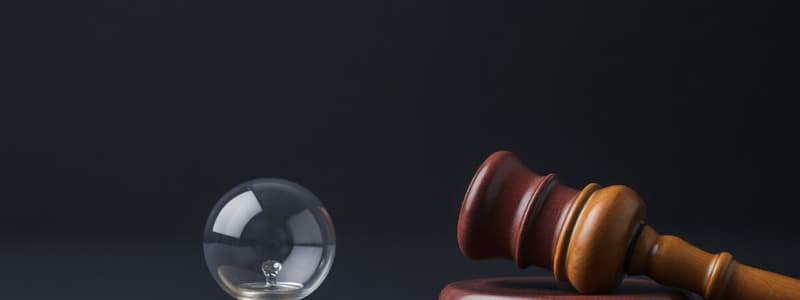Podcast
Questions and Answers
What is a key purpose of laws requiring disclosure of product information to consumers?
What is a key purpose of laws requiring disclosure of product information to consumers?
- To protect companies from liability claims
- To restrict the marketing of certain products
- To ensure consumers are informed about the safety and costs of products (correct)
- To mandate the cancellation of insurance policies under certain conditions
Which of the following practices might be prohibited by consumer protection laws?
Which of the following practices might be prohibited by consumer protection laws?
- Providing detailed ingredient lists on food packaging
- Labeling safety instructions on kitchen appliances
- Automatically canceling an insurance policy for late premium payment (correct)
- Requiring banks to offer free account overview statements
What type of information are laws guaranteeing consumer access to typically related to?
What type of information are laws guaranteeing consumer access to typically related to?
- Comparative analysis of product quality across industries
- Personal finance information held by businesses and government entities (correct)
- The performance metrics of consumer advocacy groups
- The sales practices of competitors
What legal actions might strengthen consumer rights against businesses?
What legal actions might strengthen consumer rights against businesses?
What is a common requirement for businesses under consumer protection laws?
What is a common requirement for businesses under consumer protection laws?
What is the primary shift in product liability observed in the USA compared to traditional practices?
What is the primary shift in product liability observed in the USA compared to traditional practices?
What does 'caveat emptor' imply about the responsibilities of buyers and sellers in product sales?
What does 'caveat emptor' imply about the responsibilities of buyers and sellers in product sales?
Under tort obligations, what is generally expected of individuals in their daily affairs?
Under tort obligations, what is generally expected of individuals in their daily affairs?
In which legal systems is a manufacturer likely to face liability for defects in their products?
In which legal systems is a manufacturer likely to face liability for defects in their products?
What has been the trend in product liability laws over the past few decades?
What has been the trend in product liability laws over the past few decades?
Which term defined as a wrongful act outside of contractual obligations, causes injury to another person?
Which term defined as a wrongful act outside of contractual obligations, causes injury to another person?
What does the term 'caveat vendor' suggest about the seller's legal responsibility?
What does the term 'caveat vendor' suggest about the seller's legal responsibility?
Which of the following is NOT a characteristic of tort obligations?
Which of the following is NOT a characteristic of tort obligations?
What type of liability holds a manufacturer responsible for injuries without proving negligence?
What type of liability holds a manufacturer responsible for injuries without proving negligence?
Which legal principle might reduce a business's liability if a consumer contributed to their own injury?
Which legal principle might reduce a business's liability if a consumer contributed to their own injury?
What can be considered a complete defense for a business accused of product liability if the consumer knew the risks?
What can be considered a complete defense for a business accused of product liability if the consumer knew the risks?
Which of the following is NOT a basis of liability mentioned in the context?
Which of the following is NOT a basis of liability mentioned in the context?
What needs to be proven in order for a defense based on 'adequate warnings' to apply?
What needs to be proven in order for a defense based on 'adequate warnings' to apply?
Which legal system primarily uses strict liability as a basis for product liability?
Which legal system primarily uses strict liability as a basis for product liability?
In legal terms, what is 'deception' in consumer transactions often defined as?
In legal terms, what is 'deception' in consumer transactions often defined as?
What aspect of consumer protection reflects increased government involvement in recent years?
What aspect of consumer protection reflects increased government involvement in recent years?
Which of the following describes a situation covered by 'absolute liability'?
Which of the following describes a situation covered by 'absolute liability'?
What might happen if a business entity's product is linked to injuries by other producers of similar products?
What might happen if a business entity's product is linked to injuries by other producers of similar products?
What is an essential element of fraud under English and American common law?
What is an essential element of fraud under English and American common law?
What might protect a consumer against unfair treatment in contract agreements?
What might protect a consumer against unfair treatment in contract agreements?
Which market behavior reflects the globalization of the economy regarding consumer protection?
Which market behavior reflects the globalization of the economy regarding consumer protection?
Flashcards
Product Liability
Product Liability
The legal responsibility of a company for injuries caused by a defective product they manufacture or sell.
Caveat Emptor
Caveat Emptor
A Latin phrase meaning 'let the buyer beware'; the seller wasn't typically liable for product problems, unless the contract stated otherwise.
Caveat Vendor
Caveat Vendor
A modern principle, shifting responsibility from the buyer to the seller, meaning the seller might be liable for product defects.
Tort
Tort
Signup and view all the flashcards
Contract Obligation
Contract Obligation
Signup and view all the flashcards
Tort Obligation
Tort Obligation
Signup and view all the flashcards
International Product Liability
International Product Liability
Signup and view all the flashcards
Consumer Protection
Consumer Protection
Signup and view all the flashcards
Negligence
Negligence
Signup and view all the flashcards
Strict Liability
Strict Liability
Signup and view all the flashcards
Contributory Negligence
Contributory Negligence
Signup and view all the flashcards
Assumption of Risk
Assumption of Risk
Signup and view all the flashcards
Defenses
Defenses
Signup and view all the flashcards
Fairness requirements in contracts.
Fairness requirements in contracts.
Signup and view all the flashcards
Deception
Deception
Signup and view all the flashcards
Fraud
Fraud
Signup and view all the flashcards
Liability in multiple markets.
Liability in multiple markets.
Signup and view all the flashcards
Different Legal Systems
Different Legal Systems
Signup and view all the flashcards
Globalization
Globalization
Signup and view all the flashcards
State of scientific/technical knowledge
State of scientific/technical knowledge
Signup and view all the flashcards
Adequate warnings
Adequate warnings
Signup and view all the flashcards
Disclosure Laws
Disclosure Laws
Signup and view all the flashcards
Prohibited Sales Practices
Prohibited Sales Practices
Signup and view all the flashcards
Consumer Access to Financial Information
Consumer Access to Financial Information
Signup and view all the flashcards
Representative Actions
Representative Actions
Signup and view all the flashcards
What is the purpose of consumer protection laws?
What is the purpose of consumer protection laws?
Signup and view all the flashcards
Study Notes
Product Liability
- Growing concern: Businesses face increasing legal responsibility for injuries caused by their products.
- Example: A Mumbai-based TV manufacturer could be held liable if its TVs explode, causing harm.
- Varying legal systems: Liability rules differ across countries. In Europe and the USA, a company is more likely to be held responsible.
- Trend towards consumer protection: Many countries are shifting to protect consumers, increasing manufacturer/seller liability.
- Traditional approach: Traditionally handled by contract (caveat emptor – "let the buyer beware!") and tort (negligence).
- Modern approach (e.g., USA): Caveat vendor – "let the seller beware!" (with exceptions)
- Tort principles: People owe a duty of care to others to prevent harm. Negligence and resulting compensation are critical in lawsuits.
- Strict liability: Some systems hold manufacturers liable for damages, even without negligence (especially for inherently dangerous products).
- Liability bases: Countries use different combinations of contract, negligence, and strict liability for product liability.
- Common law countries (USA, British Commonwealth): Use all three (contract, negligence, strict).
- European Union: Primarily relies on strict liability.
Product Liability Defenses
- Contributory negligence: Injured consumers' negligence contributed to the injury. Complete or partial defense.
- Assumption of risk: Consumers explicitly understood and accepted the risks of using the product. Exceptions if product could be safer and no alternatives available.
- State of scientific/technical knowledge: The manufacturer lacked the knowledge to detect the defect at the time (as a defense).
- Warnings and disclaimers: Manufacturers provided warnings about product risks; limited responsibility for consumer misuse.
Consumer Protection
- Government involvement: Governments increasingly play a role in protecting consumers.
- Globalization impact: Growing global trade and consumer transactions necessitate more protection.
- EU Green Paper: The EU has consumer protection objectives, but their full implementation is yet to be seen in member states.
Consumer Protection Examples
- Fairness in contracts: Standard-form contracts often lack consumer power. Regulations might include: replacement of defective items, a process for disagreements with the seller/manufacturer.
- Deception and fraud: Laws prohibit misleading consumers. Fraud (intentional misrepresentation.) requires specific elements (misrepresentation, intent, knowledge, reliance, injury)
- Product information disclosure: Laws require companies, like banks and financial services companies, to disclose product (financial product, kitchen appliance, food product) information (fees, safety, ingredients, instructions)
- Prohibition of certain sales practices: Disallowing unfair clauses in insurance contracts.
- Financial information access: Consumers should have access to business info, assisting their financial decisions.
- Representative actions/class actions: Provide a meaningful solution for consumers against large businesses.
Studying That Suits You
Use AI to generate personalized quizzes and flashcards to suit your learning preferences.




